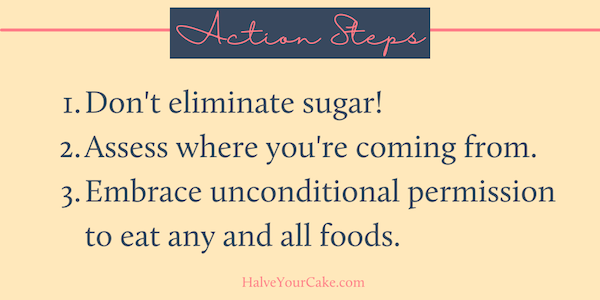Sugar Addiction- Real or Fake? 3 Tips For When You Feel Out of Control Around Sugar
Have you ever wondered, “Am I addicted to sugar?” Unfortunately, the concept of sugar addiction gets thrown around a lot in the wellness industry, mainly as a scare tactic to convince you that you are desperately in need of their particular diet plan, cleanse or detox to help cure you of said addiction. They even cite research studies that they believe back up their claim that sugar addiction is real. However, the actual answer to this question is: NO. You are not addicted to sugar. In this post we’re going to dive into what is going on in your body and mind that may be masquerading as addiction or causing out of control sensations around sugary foods. Then we’ll give you some steps forward to making peace with sugar and breaking the cycle of restriction and binging.
The physical aspect
Reaching for sugar- aka carbohydrates- is simply what our bodies do when our bodies are trying to survive. If you’ve dieted in any form, whether it was strict adherence to an eating plan like Whole 30 or just trying to “be good” about limiting your portion sizes, the diet mindset triggers the same physical responses in your body. The body experiences dieting like starvation and consequently responds by consuming extra to prepare for and protect you from the next period of deprivation. Carbohydrates are the best, simplest energy source, so this is where your brain goes when it tells the body to store up energy.
Also, let’s think about what we really mean when we say we consume a lot of sugar. We’re surely not sitting eating sugar out of a bag with a spoon, so what we really mean is that we’re eating foods that contain sugar. Let’s go ahead and acknowledge that, YES, sugar and other foods DO trigger the dopamine-reward cycle. This is how early humans stayed alive, so without this important physiological process, humans wouldn’t have survived. Also important to remember is that this same dopamine-reward cycle is triggered by other stimuli, like naps, exercise, sex, social connection and many other foods. So why don’t we see the wellness industry vilifying exercise or social gatherings?
Just remember that when it comes to our body’s actual physical relationship to sugar, it is one of need. Your brain requires glucose (a sugar) to function; that is its energy source. This is how your brain is able to communicate with the rest of your body to carry out all the necessary biological functions to stay alive and thrive. So to say that you can or should go without sugar is simply not the way the body was designed.
The mental aspect- restriction
So we talked about the body’s physical need for sugar, but why do we feel so crazy about high-sugar foods compared to the other components of our eating patterns? The answer goes back to what we addressed earlier- the dieting or restriction mindset. It not only results in a physical response of needing sugary foods, but it also creates a psychological response. Forbidden foods are often carbohydrate based. Think about the foods most commonly on the “bad” list for any given diet: pizza, brownies, cake, ice cream, bagels, bread, etc. These aren’t all necessarily super sweet foods, but they all have carbohydrates and sugars in some form. Mentally categorizing these things as bad can contribute to your own cravings, obsessions and over-eating when you do have them.
Lastly, remember that sugar in food IS pleasurable. It doesn’t need to be a guilty pleasure, just a normal, healthy pleasure. As humans, we desire pleasurable things. Therefore it makes perfect sense, and is in no way unhealthy, that we enjoy eating sugar-containing foods.
What does the research say?
This is an important piece to address as many of the people with questions about sugar addiction have heard or read that there is scientific evidence to support the idea. First, the research that has been done in human studies and argues in support of food addiction uses the Yale Food Addiction Scale which requires a person to self-report on their own experience, and does not take into account their history or relationship with food and the possible coexistence of food restriction or a diet mindset. We already know based on neuroscience studies that when you restrict food or a certain type of food, the reward sensation of that food DOES increase. So if a study measures if the reward sensation of a certain food is high, without accounting for restriction or that person’s limited consumption of that food previously, then it’s simply telling us what we already know, which is that restricting does increase the desire for a food and the positive feeling you get after consuming it.
Next, there are studies that say sugar lights up the same parts of the brain as cocaine or other drugs. In those studies (done on rats), this happens when the rats are under forced deprivation. Just like we addressed already, we know that deprivation causes an increased reward sensation, so this isn’t telling us anything new, either. Other studies that say rats exhibit addictive and drug-seeking behavior drew these conclusions from rats that had only intermittent access to sugar. Once again, the idea of the restriction-binge cycle is proven: take something away, you want it more and obsess about it, then you over-consume when you finally get it.
Another important thing to remember is that IF sugar truly acted like a drug in our bodies, we would experience the same “high” regardless of what form that sugar came in. Yogurt would be equal to popsicles and bananas and brownies. But that’s not the case, right? So it can’t really be sugar as a nutrient that acts like a drug in our bodies. Additionally, research does not show that sugar consumption has a withdrawal effect or that your body builds up a tolerance. These two things are required as part of the definition of addiction as laid out by the DSM-5. The only food/nutrient that this has been shown to be true for is caffeine.
What do I do?
Remember that this is normal. What is being described as “addiction” should more accurately be described as feeling out of control or simply having strong cravings. Anyone who has had any disruptions from a normal, neutral relationship with food has likely experienced these same sensations as you. If you restrict, even with just a slight tweak in your mindset around foods, your body and mind will likely respond with heightened desires for certain foods, increased thoughts about food, and an increased reward sensation when you eat forbidden foods.
But your body wants to make peace with food. Your body will work with you to return to a neutral place with foods so that no single food or food group sits up on a pedestal as the holy grail of indulgence. If you start to get anxious thinking that your desire for sugar-containing food is like a drug addiction, stop and remind yourself of this: consuming moderate amounts of sugar as a part of your normal, varied eating is good, healthy, normal and actually essential (remember what we talked about with glucose providing energy to your brain). Sugar as a nutrient, in a variety of forms, exists in the majority of the foods we eat. On the other hand, consuming moderate amounts of drugs is not good, healthy, normal or essential. Sugar and drugs are not equatable in any sense, so tune out the fear-mongering people and articles that are trying to scare you into thinking they are alike.
Action steps
Don’t eliminate sugar! Trying to cut sugar from your food intake will inevitably make the issue worse. Remember how restricting causes an increased reward response? When you cut sugar out, all you are doing is making it even more highly desirable and more pleasurable when you finally “give in” and have some. This is not a step on the path to making peace with all foods and putting all foods on an even playing field.
Assess where you’re coming from. Are you recovering from an eating disorder or disordered eating? Are you coming off of a diet or eating plan? Do you still have lingering thoughts about “being good” around certain foods, having “cheat days” or limiting your portion sizes? These are all restriction mindsets in some sense. In all of these scenarios, it would make sense that you’re now reaching for more high-sugar foods. Give yourself heaps of grace and compassion. Normalize the response you’re having.
Embrace unconditional permission to eat any and all foods. We know this may feel super scary and completely unreasonable. Unconditional permission to eat is part of Intuitive Eating principle #3, Make Peace With Food. It is absolutely critical in breaking the restriction-binge cycle. We’ve said it over and over again in this post, but even the smallest bit of restriction mindset can trigger eating past fullness or feeling out of control around food. The only solution is allowing unconditional permission to eat. You may be thinking that if you let yourself have this permission, you’ll eat only ice cream and brownies for every meal, forever. But the reality is that you’d probably last a few meals or maybe a few days before your body gave you strong cues that this does not feel good and is not sustainable. Realistically, you just can’t eat like that indefinitely, and your body will let you know that it needs some variety of energy sources to feel its best. Over time as you continue to let yourself have any food in any quantity, foods start to lose their magic. When you know that any particular food is allowed at any time, your desire to binge or “go all out” goes way down, because your access isn’t limited to a particular day or time so there’s no reason to eat more than feels comfortably satisfying in that moment.
The bottom line is that if you would describe your feelings towards sugary foods as an addiction, the first thing you probably need to do is re-incorporate sugary foods in your everyday eating. Normalizing these foods through daily exposure is probably the quickest pathway to returning to a place of neutrality with sugary foods. The goal isn’t to feel “in-control” around sugary foods, but rather to feel neutral towards them. Imagine a shoulder shrug. You enjoy the foods that taste good to you but there’s no need to binge because you can have it again tomorrow, and the next day, and the next.
Ready to take the first step? Schedule a discovery call to learn more about working with a Registered Dietitian OR grab your free guide on 6 Steps to Heal Your Relationship with Food.









